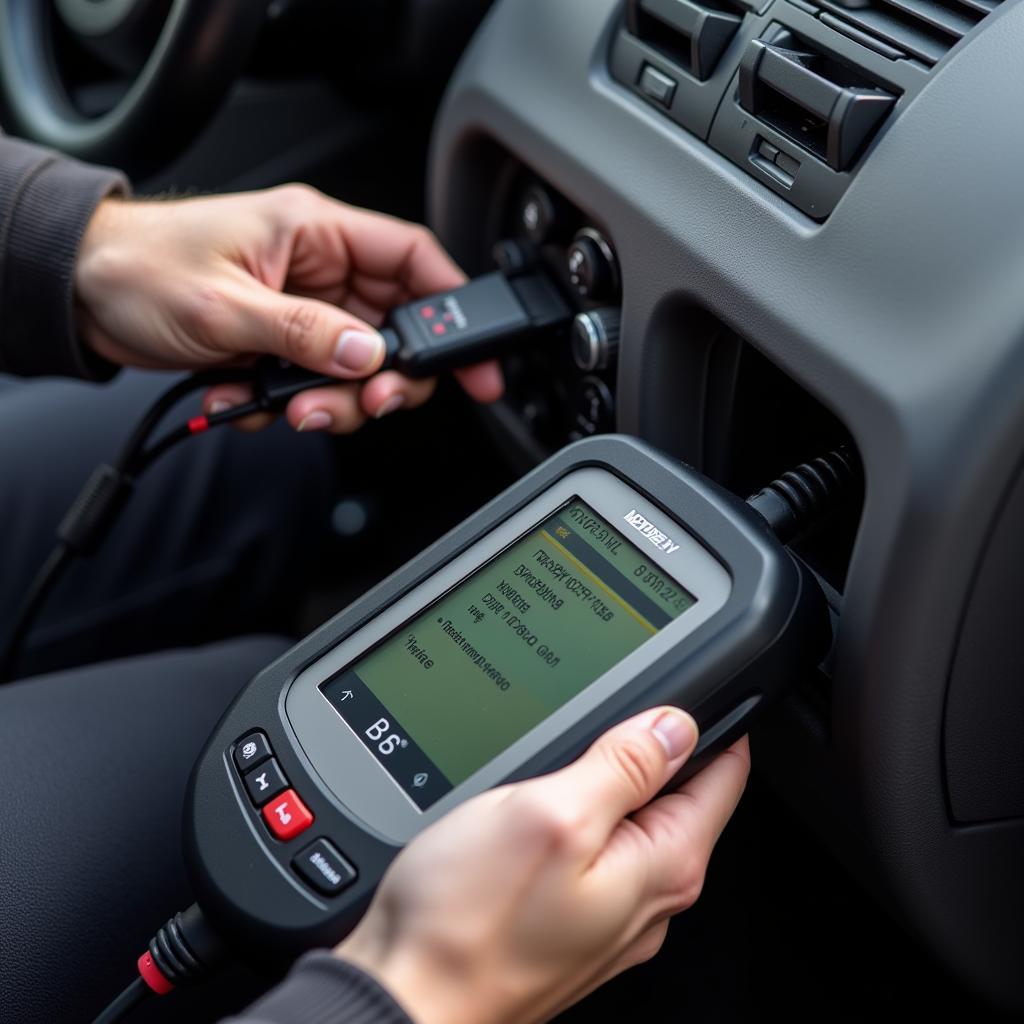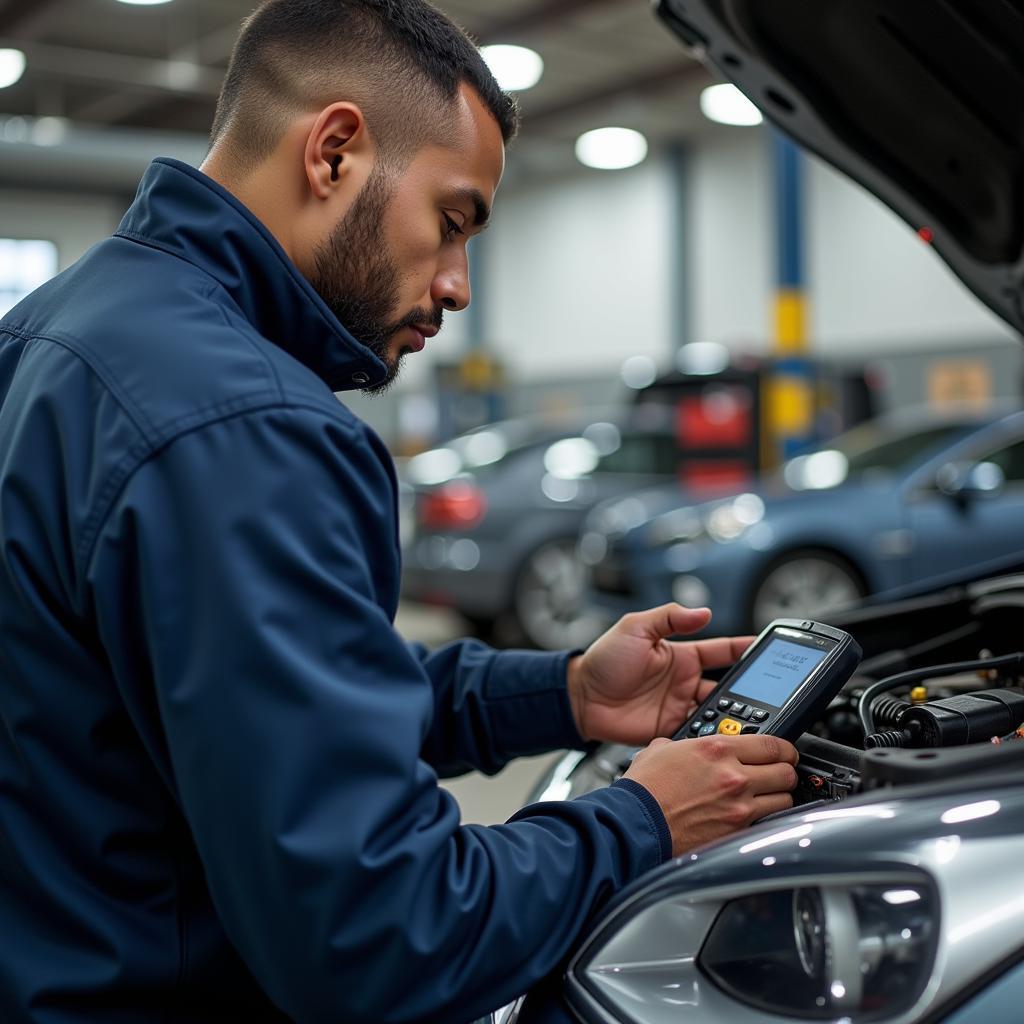A car diagnostic, in simple terms, is like a health checkup for your car. It involves using a specialized tool, called a car diagnostic scanner, to communicate with your car’s computer system. This system, also known as the Engine Control Unit (ECU), continuously monitors various sensors placed throughout your vehicle. These sensors collect data on everything from engine temperature and fuel pressure to airbag status and emissions levels.
 Car Diagnostic Scanner in Action
Car Diagnostic Scanner in Action
Deciphering the Language of Your Car: What a Diagnostic Does
When you experience car trouble, it can feel like your vehicle is speaking a foreign language. That’s where car diagnostics come in. Here’s a breakdown of what happens during a diagnostic scan:
- Connection: The diagnostic scanner connects to your car’s OBD-II port, typically located under the dashboard on the driver’s side.
- Communication: The scanner sends requests to your car’s ECU, asking for specific data based on the type of scan being performed.
- Data Retrieval: The ECU responds by providing the requested data, which includes information from various sensors and systems.
- Analysis: The scanner interprets the data, translating complex codes and measurements into understandable information about your car’s health.
Why Car Diagnostics are Essential for Modern Vehicle Owners
In today’s technologically advanced vehicles, car diagnostics have become indispensable for several reasons:
- Early Problem Detection: Diagnostics can identify potential issues before they escalate into major repairs, saving you time, money, and stress in the long run.
- Accurate Diagnosis: By analyzing sensor data, car diagnostics provide a more accurate and efficient way to pinpoint the root cause of car problems, eliminating guesswork and unnecessary repairs.
- Improved Safety: Regular diagnostics can detect issues related to critical safety systems like airbags, brakes, and stability control, ensuring your car remains safe to drive.
- Increased Resale Value: A well-maintained vehicle with a documented diagnostic history can significantly enhance its resale value, giving potential buyers confidence in its condition.
Understanding Different Types of Car Diagnostics
Car diagnostics are not a one-size-fits-all solution. There are different types of scans, each serving a specific purpose:
- OBD-II Scan: This is the most common type of scan, focusing on the engine and emissions systems. It retrieves and interprets diagnostic trouble codes (DTCs), providing clues about potential malfunctions.
- Enhanced Scan: This type of scan goes beyond basic OBD-II checks, delving deeper into specific systems like transmission, ABS, airbags, and more. It provides a more comprehensive picture of your car’s overall health.
- Manufacturer-Specific Scan: Some car manufacturers use proprietary software and protocols, requiring specialized scanners to access and interpret their vehicle data. These scans are essential for diagnosing complex issues and accessing advanced features.
 Mechanic Performing a Diagnostic Test on a Car
Mechanic Performing a Diagnostic Test on a Car
Common Questions About Car Diagnostics
What does a car diagnostic tell you?
A car diagnostic can reveal a wide range of information about your vehicle, including:
- Diagnostic Trouble Codes (DTCs): These codes indicate specific areas where the ECU has detected a problem.
- Sensor Data: The diagnostic scan provides readings from various sensors, offering insights into engine performance, fuel efficiency, emissions levels, and more.
- System Status: You can gain an understanding of the health and functionality of different vehicle systems, such as the engine, transmission, brakes, airbags, and others.
Who can run a diagnostic on my car?
While you can purchase your own OBD-II scanner, it’s generally recommended to have a qualified mechanic or technician perform car diagnostics. They have the expertise to interpret the data accurately and provide reliable recommendations for repairs. If you’re curious about who can help you, you can find more information on our page about who can run a diagnostic on my car.
What is the cheapest diagnostic car reader for the Koleos?
Finding the cheapest option doesn’t always guarantee the best results. It’s crucial to choose a car diagnostic reader that’s compatible with your Koleos and provides accurate readings. To explore your options for a cost-effective diagnostic reader, check out our article on what is the cheapest diagnostic car reader for the koleos.
What does car diagnostic consist of?
A comprehensive car diagnostic typically involves the following steps:
- Connecting a diagnostic scanner to the vehicle’s OBD-II port.
- Retrieving diagnostic trouble codes (DTCs) and sensor data.
- Analyzing the retrieved data to identify potential issues.
- Recommending necessary repairs or maintenance based on the diagnostic findings.
If you’re interested in learning more about the specific components and procedures involved in a car diagnostic, you can delve deeper into what does car diagnostic consist of.
What can stop a diagnostic with your car?
Several factors can hinder a successful car diagnostic, including:
- A faulty OBD-II port or wiring issues.
- A dead car battery or electrical problems.
- Incompatible or faulty diagnostic equipment.
- Software glitches or communication errors between the scanner and the vehicle’s ECU.
If you’re facing challenges with running a car diagnostic on your vehicle, understanding the potential obstacles can be helpful. Our article on what can stop a diagnostic with your car provides valuable insights into common issues and troubleshooting tips.
Staying Ahead of the Curve: The Importance of Regular Car Diagnostics
Just like regular doctor visits are crucial for maintaining good health, regular car diagnostics are essential for keeping your vehicle in optimal condition. They can help you avoid costly repairs, improve fuel efficiency, and ensure a safer driving experience. By understanding the ins and outs of car diagnostics, you can empower yourself to make informed decisions about your vehicle’s maintenance and repairs.
Remember, knowledge is power when it comes to car care. By staying informed and proactive, you can keep your car running smoothly for years to come.
Need Expert Assistance?
Contact us via WhatsApp: +1(641)206-8880 or Email: [email protected]. Our dedicated customer support team is available 24/7 to answer your questions and provide guidance.

Leave a Reply